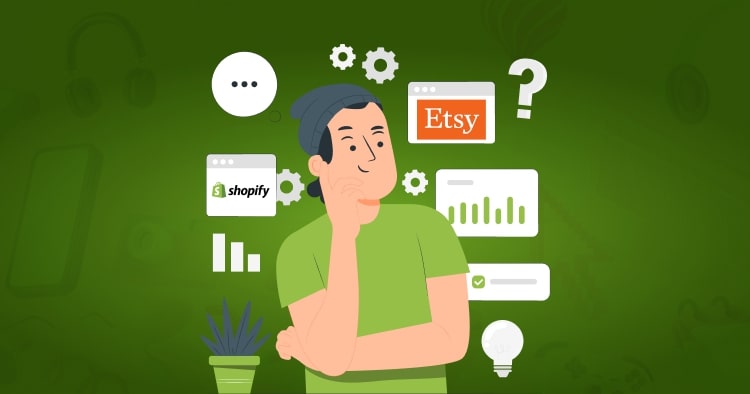Selling on Shopify vs Etsy: which is better Shopify or Etsy?
Last Updated | April 9, 2024
Table of Contents
An Overview: Selling on Shopify vs Etsy
Selling products online is a new trend. This trend has increased tremendously due to the COVID-19 pandemic. Most people have been looking for alternatives for their businesses and now have resorted to using eCommerce platforms to help establish their businesses in the digital world. Various platforms are available out there that can fit the bills and allow you to establish an e-store for your business. Out of the numerous platforms available, Shopify and Etsy are two well-known platforms that you can consider for selling your products online. All their features have been discussed below, which can help you to make a better decision between the two viable eCommerce platforms.
What is Etsy?
Etsy is a well-known global ecommerce platform, functioning since 2005, that allows you to sell a wide range of products on their website. Its main focus is to sell products that are handcrafted, unique, or vintage. These products can be from any categories, such as bags, jewelry, clothing, furniture, toys, etc. To sell items as vintage, you must ensure that the products are twenty years old. It is a great platform for buyers who would like to shop for products that are different than the usual, and likewise, for sellers, who sell products that are different than the usual. You can start your web store on Etsy with just $0.20, and use the powerful tools to set up your dream store. In addition to all these benefits, you can be sure about the security provided by Etsy, making the shopping experience for your customers safe, and also safe for the sellers.
What is Shopify Ecommerce Development Platform?
Shopify is another well-known, hosted, all-in-one eCommerce platform, headquartered in Ottawa, Ontario. It is a great platform to start, run and grow your business. Shopify has over 1,000,000 businesses running on its platform globally, with the number increasing every day. Unlike Etsy, you can sell whatever products you want, not being specific to vintage or unique items. Products from all categories, such as jewelry, furniture, shoes, clothes, etc., can be sold on Shopify.
Why do we need to compare Etsy with Shopify?
Both are good eCommerce platforms, with specific features suitable for different sellers. Their features have been compared to give you a better idea about which platform is the right one for you. Both of these platforms are famous for sellers and buyers. Although both platforms provide various features, but they have their advantages and disadvantages. One main difference between the two is that Shopify is a great platform that lets you build your online store, with the various tools they provide. On the other hand, Etsy is an online marketplace that lets you list down your products alongside other sellers.
| Feature/Aspect | Shopify | Etsy |
|---|---|---|
| Purpose | E-commerce platform for creating and managing online stores | Marketplace for handmade, vintage, and unique goods |
| Customization | Highly customizable; allows for unique branding and design | Limited customization within Etsy’s platform |
| Cost | Monthly subscription fees; transaction fees unless using Shopify Payments | Listing fees, transaction fees, and payment processing fees |
| Branding | Full control over branding and store design | Limited branding opportunities; Etsy branding is prominent |
| Traffic | Dependent on store marketing efforts; less organic traffic compared to Etsy | Built-in organic traffic due to Etsy’s marketplace |
| Inventory Management | Advanced inventory management tools and integrations | Basic inventory management tools |
| Payment Options | Multiple payment gateways supported; Shopify Payments available | Limited payment options; Etsy Payments available |
| SEO | Full control over SEO optimization | Limited SEO capabilities within Etsy’s platform |
| Customer Support | 24/7 customer support | Customer support via Etsy and community forums |
| Scalability | Highly scalable; suitable for small to large businesses | Suitable for small to medium-sized businesses |
| Additional Features | Extensive app store for additional functionalities; blogging platform | Social media integration; Etsy Ads for promotion |
| Target Audience | Businesses looking for a standalone online store | Independent sellers looking for a marketplace platform |
Summary:
- Shopify is better suited for businesses looking to create and manage their standalone e-commerce stores with greater customization, control over branding, and scalability options. It offers advanced inventory management, multiple payment options, and extensive app integrations.
- Etsy is better suited for independent sellers who are looking for a marketplace platform with built-in organic traffic. It offers a simpler setup process, limited customization, and branding opportunities, but benefits from Etsy’s established customer base.
Ultimately, the choice between Shopify and Etsy depends on your business needs, target audience, and long-term goals.
Shopify vs. Etsy- which one is the right platform for you? Continue reading to find out.
Functionality
Functionality makes your store stand out from the rest of the stores. Both platforms offer diverse functionality for your web store.
SHOPIFY:
With a built-in Shopify app, you can increase your functionality by integrating third-party apps with your web store. Although Shopify offers most of the basic functions for your store, not to forget to mention, better than Etsy.
ETSY:
Etsy offers the most basic features of all. The layout for every web store is the same. For your web store to look more unique than the rest, you can make use of the apps and integrations available for Etsy.
Shopify vs. Etsy: Shopify is the clear winner here as it offers more functionality than Etsy.
Design
The design of your store will help you to attract a lot of customers to your store. It is a good point to remember that aesthetics plays a very important role in the running of your store. Nobody likes a boring store with just the basic features. However, this does not mean that you should opt for a very fancy and overly done store. Shopify and Etsy provide some designing features that can help you to design the store of your dreams.
SHOPIFY:
Your Shopify web store design lets you from the free and premium themes that they offer. There is something unique for every industry in these designs, providing your store with a relevant outlook. These themes are customizable, and you get to set up your store, however you would want to. This makes you totally in charge of your web store’s design and outlook.
ETSY:
With Etsy, you do not get any options, but to rely on the standard layout of Etsy for every seller. This limits your option of standing out from the rest, affecting your business too.
Shopify vs. Etsy: In terms of designing, Shopify is the clear winner because you get the reins for designing your store however you please.
Themes
Shopify and Etsy both have very different approaches to the themes for their sellers. The features of their themes have been discussed below to give you a better idea of what to expect from these two platforms.
SHOPIFY:
Shopify provides its users with numerous options to choose from, including free and premium themes. You can even get custom designs from Shopify’s theme generator HTML/CSS, to get a more customized look for your store. Shopify’s themes cover most of the industries in their themes, provide a unique experience to your store. These themes range between $140 to $180. These themes are modern and professional, and you can switch between themes easily, without having to reformat your content too much.
ETSY:
All sellers on Etsy have the same page layout for their stores. You do not have the option to create a unique storefront, to stick to the format and layout pre-set by Etsy. This can be an advantage because you do not have to worry about designing your store much, and you can rely on Etsy for providing you with a clean, attractive design to display your products. This can also be a disadvantage because the chances of standing out from the crowd are very slim. If you are just starting, this would not bother you much, but if you want to grow your business, this would be a big hindrance in your plans.
Shopify vs. Etsy: Since Shopify lets you create a unique and different storefront, Shopify is the winner. If you would like to create an identity for yourself and go big in the future, Shopify is the right platform for you.
Development Time
Nobody would like to spend too much time designing their store. Everybody is on a lookout for a platform that is user-friendly and does not require too much development time.
SHOPIFY:
With Shopify, you can customize your store however you want. This does not require too much time, and it depends upon how quickly you can design your store. Shopify has a very user-friendly and easy to understand interface, which should not take too long for you to design your store.
ETSY:
Since Etsy does not have any options for you to customize your store, setting up your store on Etsy hardly requires any time. You can only use the standard format of Etsy for your store.
Shopify vs. Etsy: Since you do not have an option of customization with Etsy, your development time is much less than Shopify.
Features
Before investing in any ecommerce platform, it is advised that you thoroughly review all the features provided by that particular platform. Shopify and Etsy provide various features for you to run your web store comfortably. Etsy vs. Shopify- which platform provides you with the best features?
SHOPIFY:
A few of the features that you get on Shopify’s plans are:
—Sell unlimited products
—Sell products from any category
—Shopify POS (Point of Sale) app
—Multiple themes available
—Calculated shipping rates with third-party apps
—Abandoned Cart Recovery: emails are sent to customers who abandoned their carts
—Free SSL certificate: for extra security
—Discount codes: to attract more customers and encourage them to shop again
—Multichannel selling on different social media platforms: for a wider customer base
—Gift cards
—Fraud analysis
—Inventory management
—Sales dashboard to get an insight into your sales
ETSY:
A few of the features that you get on Etsy’s plans are:
—Sell unique, vintage and handcrafted goods
—No need to spend on the outlook of your store
—Get customizable options, such as banner templates
—Own web address
—Discounts on marketing materials, such as business cards
—Send email alerts to customers once their desired items are back in stock
—Advertising credits
—Get more traffic to boost your sales
—Get basic sales reports and analytics
Shopify vs. Etsy: Shopify offers more features than Etsy, being the clear winner. Selling on multiple channels is the biggest plus point on Shopify’s platform.
Payment Gateways and Fees
Processing payments swiftly and promptly should be a feature of the ecommerce platform you choose. The more payment gateways you have, the better it is for your customers. However, the charges charged by the ecommerce platform and the payment gateway company must not be too high. Shopify fees vs. Etsy fees- which one is better?
SHOPIFY:
Shopify has its payment gateway option called Shopify Payments. they do not charge any transaction fee, but you have to pay the card processing fee i.e. 2.2%, with an additional $0.20. However, using Shopify Payments Gateway is not necessary, you can use any other payment gateway too. In this case, the highest transaction fee is 2%, and 0.5% being the lowest.
ETSY:
Etsy charges the following:
—A listing fee of $0.20 per product listed for four months or until the item is sold
—A 5% transaction fee for every transaction
—A payment processing fee of 3%, with an additional charge of $0.25
The payment processing fee is usually charged by the credit card company or the payment gateway.
Shopify vs. Etsy: Etsy’s rates are slightly higher than Shopify, causing Shopify to become the winner.
Budget and Pricing
Pricing plays an important role in determining the platform you would like to invest in. Small or medium-scale businesses would not like to spend too much on advanced price plans for more features. They would rather opt for basic price plans to get basic features to run their stores. The price plans for Shopify and Etsy have been discussed below.
SHOPIFY:
Shopify’s price plans start at $29 per month. Before you pay up for the price plan, you can avail of Shopify’s free 14-day trial, without any credit card. In addition to these price plans, you would also have to pay a transaction fee for every sale you make.
Shopify Price Plans
—Basic: $29 per month (You will get a Shopify website, a transaction fee of 2.9% for every transaction and $0.30. Use discount codes and get two employee accounts too)
—Shopify: $79 per month (You will get all the features of Shopify Basic, with the addition of five employee accounts and the ability to use gift cards. The transaction fee is reduced to 2.6% plus $0.30 for every online transaction)
—Advanced Shopify: $299 per month (You will get fifteen employee accounts and advanced reporting abilities. the transaction fee is reduced to 2.4% for online sales, in addition to $0.30 for every transaction.)
—Shopify Plus: enterprise option (Features vary with the requirements of the client)
The main difference between these price plans varies in terms of the number of staff accounts available, credit card transaction fees, shipping discounts, and other extra features, such as abandoned credit card recovery, shipping rate calculators, etc.
ETSY:
Etsy, unlike Shopify, has a 5% transaction fee, $0.25 for payment processing, and a 3% commission fee. If the sales have been made through Etsy’s offsite ads, the commission fee would be increased to 12% to 15% per transaction. Furthermore, a recurring fee of $0.20 would be charged per product listing, every four months.
Etsy Price Plans
—Etsy Standard: no additional costs apart from transaction fee, listening and advertising fee
—Etsy Plus: $10 per month (You will get advanced shop customization options, discounts on custom packaging, and promotional materials. You will also get a monthly budget of credit cards for listings and Etsy Ads, and a discount for a custom web address for your Etsy store,
Etsy Pattern: $15 per month (You will get the added benefit of having your domain name, in addition to your storefront.)
Shopify vs. Etsy: The platform you choose depends on your requirements and budget.
Marketing Tools
Once you have set up your online store, you should start marketing it. Have a good storefront does not mean that it would be enough to attract customers. You need to use other tools too, to attract more customers. Etsy and Shopify both provide their users with some marketing tools to help boost their sales. These features have been discussed below.
SHOPIFY:
Shopify will provide you with all the tools you require to boost your business yourself. This also includes managing the Search Engine Optimization (SEO) by yourself, and also promote yourself on social media on your own. Although this is additional work on your part, but it makes you in charge of the marketing campaigns of your store.
ETSY:
Etsy is a very big platform with over 33 million buyers making purchases from the stores. Buyers who search for vintage or handmade items, Etsy shows up on the search engines. This, however, does not guarantee that the buyer would land on your store. Over 50 million products are being sold on Etsy’s platform. Hence, your main aim should be to stand out from the other stores to boost up your sales.
Shopify vs. Etsy: Etsy does everything, all you have to do is sit back and relax and wait for your products to be picked out by different buyers. On the other hand, Shopify gives you more control of your store, but you have to manage the marketing of your store, and the SEO of your store on your own. Due to this reason, Etsy is the winner here.
SEO
Search Engine Optimization (SEO) is a good way of increasing your chances to show up on search engines. This helps to increase your web store’s options of being spotted, and buyers purchasing from your store. both this ecommerce does a decent job of providing you with these features. You have to choose the one you are comfortable working with.
SHOPIFY:
Shopify provides you with all the tools you need to promote your web store. It does not do it for you, but it expects you to utilize the tools however you please. There are numerous apps available on Shopify Apps, that you can use to get a better SEO experience.
ETSY:
Etsy looks after everything regarding your store. People who search for vintage or unique products, definitely get to see the option of Etsy on search engines. However, it does not guarantee that your products would show up.
Shopify vs. Etsy: Both the platforms provide benefits that cater to the different requirements of the sellers. The options provided by both these platforms are good in their way. Hence, this is a tie.
Customer Help and Technical Support
A platform that has a 24/7 technical support team is extremely essential. Since business never stops, your chosen platform must provide you with technical support around the clock. You never know when you wake up and find all your product images missing.
SHOPIFY:
The Shopify Help center provides its users with a 24/7 technical support team, with the added benefit of technical support over the phone. Apart from this, you can get help through a 24/7 live chat support, forums, emails, video tutorials, social media, and advanced specialist Shopify support (only available on the Plus price plans). The Shopify help center is extremely user-friendly, with an extensive range of guides and help support. They also offer an online community called Ecommerce University.
ETSY:
The Etsy Help Center provides its users with a very simple and easy to use interface that takes you straight to the answer of your query. It also has a forum and community discussion space, where you can discuss different issues with other fellow users. You can get support from the technical team through emails too, and also schedule a phone call with the technical support team, in case the email and forum discussions are not of enough help.
Shopify vs. Etsy: The clear winner is Shopify here. Shopify provides technical support 24/7, even on phone calls. On the other hand, Etsy only relies on forums and community discussions for solving issues. The technical support team is not readily available over the phone.
Integration
Since you can never find the perfect platform for your ecommerce store, you have to integrate third-party applications or plugins, to help achieve the desired features. Some apps or integrations can be free, some may have a free trial period, or some may have a monthly subscription fee.
SHOPIFY:
Shopify offers more than four thousand apps on its app store. These apps are by Shopify and also by third-party developers. These apps serve different purposes, such as helping you in-store designing, inventory management, orders, and fulfillment, etc. It would be a great idea if you could visit and explore the Shopify integration with the help of app before plunging into this platform.
ETSY:
Etsy does not offer a variety of functions; instead, it offers very basic features for your web store. To see which apps and integrations are available for your Etsy store, you must create an account and set up your store before accessing these apps and integrations. Since that sounds a bit too risky, it would be a great idea if you could search online for the apps and integrations available for Etsy.
Shopify vs. Etsy: Shopify is the winner since you can access the app store without having to create an account first. This is not the case with Etsy.
Sales Features
Selling products online requires you to have good sales features. If you do not get good sales features, the purpose of selling online is defeated, even if you have a very unique looking store. Having good sales features should be one of the top priorities for choosing a platform for ecommerce.
SHOPIFY:
Shopify is considered to be a very good platform in terms of sales features. Unlike Etsy, you can sell whatever products you want. Furthermore, there is no limitation on the number of products you can sell on Shopify. This is the best sales features of Shopify if you want your business to grow. If this is not enough, you can add more features from the Shopify app store, to enhance the functionality of your store.
A few of the sales features offered by Shopify are:
—Sell unlimited products from any category
—Multichannel selling on various social media platforms
—Discount codes
—Gift cards
—Abandoned Cart Recovery
—Third-party calculated shipping rates
—Numerous payment gateway options
—Inventory management
ETSY:
Etsy provides its users with basic ecommerce features, to help manage your store easily. To help you stay on top of your game, you can make use of the Sell on Etsy App. You can use your account on this app to manage orders, edit listings, respond to queries of your buyers, and buy and print discounted postage for your orders. The only main disadvantage of selling on Etsy is that you can only sell vintage, handmade, and craft supplies. Another disadvantage is that the inventory cannot be managed by Etsy itself; you need a third-party app for it.
A few of the sale features of Etsy are:
—Sell unique, vintage and handcrafted goods
—Discounts on marketing materials, such as business cards
—Email alerts sent to customers once the items are back in stock
—Advertising credits
Shopify vs. Etsy: It is pretty evident from the discussion above that Shopify provides its users with better features than Etsy.
Inventory Management
Selling online requires you to manage your inventory vigilantly. You cannot afford to have a mismanaged inventory, as it would disappoint your customers, and you would eventually start losing customers. This would impact your sales tremendously. For this reason, managing your inventory well should be one of the priorities of running your web store.
SHOPIFY:
Shopify provides you with a basic inventory management feature. It syncs your customer orders with your inventory, to make sure no mishaps regarding orders take place. Furthermore, you can even sync your offline sales with your Shopify inventory. You can upload products in bulk or one at a time. You can track and analyze your sales with the in-house management tools provided by Shopify. If you feel this feature is not enough, you can integrate your inventory with third-party apps from Shopify’s app store.
ETSY:
Since Etsy is a marketplace and not a platform, you are supposed to maintain your inventory record somewhere else, using third-party apps that integrate Etsy sales with your inventory.
Shopify vs. Etsy: Since Shopify offers a basic inventory management feature, it is the clear winner. On the other hand, Etsy requires you to get help from third-party apps.
Mobile Responsiveness
In this digital era, all ecommerce platforms have made sure that their websites are mobile responsive and compatible with all devices, including mobile phones, tablets, and computers. Etsy and Shopify have joined the bandwagon and offer themes that are mobile responsive so that the buyers do not miss out on the experience of shopping from your store.
Application Integrations
Application integrations help to make your store better. On Shopify, you can integrate your store with third-party applications from the Shopify App Store, to increase the functionality of your web store. On Etsy, you need to use third-party applications for managing your inventory.
Final Thoughts
Choosing the right platform for your web store mostly depends upon your requirements and budget. If you want to sell antique and unique goods, without wanting to expand your store in the future, then Etsy would be a good option for you. However, if you want to expand and grow your business in the future, then you should consider Shopify. It lets you sell any product you want to sell- without any restrictions. Moreover, none of these platforms can provide you with all the features you require; they may provide you with the most desired features, if not all. For this reason, you can make use of third-party applications and integrations for your store on Etsy or Shopify.
Etsy vs. Shopify vs. Storenvy: Which one is the best and why?
Shopify is the best option for these three if you want to build a big name for yourself. However, this is also possible with Storenvy, but it has very limited add-ons to enhance your functionality. Shopify, on the other hand, has a better app store, and offers better functionality than both the other platforms. On Shopify, you can sell an unlimited number of products from any category, unlike Etsy, that only allows you to sell unique and handcrafted goods.
Etsy vs. Shopify vs. Amazon: How do they compare with each other?
Etsy and Amazon offer a similar marketing approach. Etsy stands out from the other two platforms because it is a marketplace for antique and handcrafted goods. It does not offer scalability for your business, and it charges more fees than the others, which can be expensive in the long run. Shopify and Amazon seem to be similar in the features and tools they provide.
Etsy vs. Storenvy vs. Shopify: Which is better?
Shopify is the better one out of the three. It has better sales features than the other two platforms, and allows you to expand your business, without any such great difficulties. Furthermore, it offers a free SSL certificate on all price plans, adding an extra layer of protection. Shopify also offers better apps and integrations to boost your store’s functionality.
Is it cheaper to sell on Etsy or Shopify?
In the long run, it would be cheaper to sell on Shopify, as it offers scalability for your business. The fees charged by Shopify would be compensated by the profit earned.
Can you use Shopify with Etsy?
Yes, you can create your stores on both the platforms, and use a third-party app to cross-list and sync the inventory. You start by creating a list of products on Etsy. Once the sales increase, you can create a store on Shopify and maintain an inventory on Shopify. Then, use Etsy as a marketing channel, with only top-selling products listed. Then, you can use a third-party app to cross-list and sync your inventory. You can use Etsy as your marketing channel, as it drives sales to your website.
Why is selling on Etsy a bad idea?
Etsy is not a good option if you plan on expanding your business. It is a marketplace where all the products are listed, with a standard store layout for all the stores. Etsy charges a lot of various fees for every transaction, as discussed above in the blog. In the long run, it would be a problem because you would be losing out on a lot of money, decreasing your profits.









